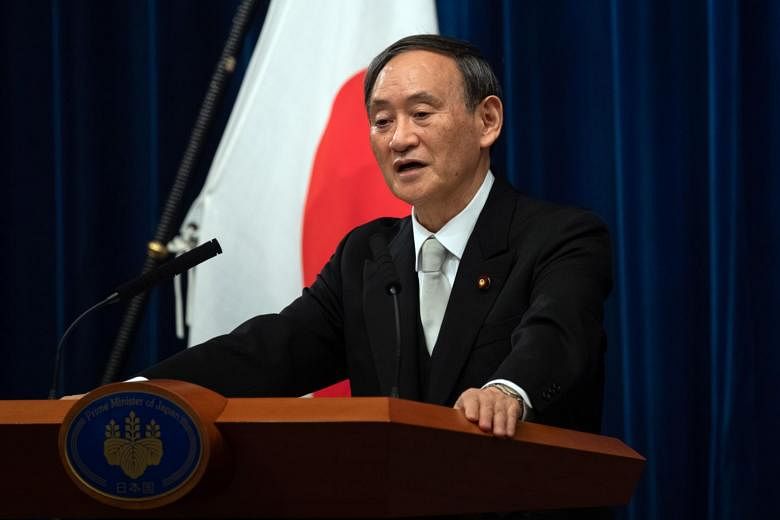TOKYO - Mr Yoshihide Suga, who was sworn in as Japan's 99th Prime Minister on Wednesday (Sept 16), pledged to further the policies undertaken by predecessor Shinzo Abe and to reduce bureaucratic inefficiencies.
Mr Suga, 71, has been one of Mr Abe's most trusted allies as Chief Cabinet Secretary since December 2012, fronting 3,213 government news conferences and defending him through thick and thin, even at the height of scandals.
The power change at the peak of Nagatacho, Japan's political epicentre, comes after Mr Abe, who turns 66 next Monday, abruptly quit last month over a chronic health condition.
Mr Suga's government was sworn in by Emperor Naruhito on Wednesday, and, at his first news conference as PM later that night, said: "Politics cannot tolerate a vacuum."
He vowed to overcome the Covid-19 crisis and said that he will continue with policies like Abenomics - fiscal spending, monetary easing and structural reforms - and push for reforms in areas such as bureaucratic sectionalism.
While Mr Suga is lacking in diplomatic experience, he said on Wednesday night that he will pursue Abe-era objectives including the Free and Open Indo-Pacific policy. He also sees as "his highest priority" a resolution of the North Korean abduction issue.
But he notably distanced himself from an Abe-era scandal: The controversial cherry blossoms garden party, in which Mr Abe was alleged to have wined and dined his voters.
He said on Wednesday that he will scrap the party, which has seen a ballooning budget in recent years, adding: "I was always against requesting a budget for this event."
Mr Suga's ascent as leader of the world's third-largest economy drew felicitations from foreign leaders. The White House said United States President Donald Trump is "ready to continue pursuing the vision of a free and open Indo-Pacific that he and former Prime Minister Shinzo Abe forged".
Chinese President Xi Jinping, in a congratulatory message to Mr Suga, urged "the development of long-term stable, friendly and cooperative Sino-Japanese relations", according to a readout by the official Xinhua news agency.
"This is in the fundamental interests of the two peoples and is also conducive to peace and stability in Asia and the prosperity of the world," he was cited as saying.
South Korean President Moon Jae-in told Mr Suga in a letter that he was willing to sit down anytime for dialogue to improve their strained bilateral ties. He added that Japan was South Korea's "closest friend geographically and culturally, as well as sharing basic values and strategic interests".
Other leaders, including Russian President Vladimir Putin, British PM Boris Johnson, Indian PM Narendra Modi and Singaporean PM Lee Hsien Loong also sent congratulatory messages to Mr Suga.
Mr Abe, who is Japan's longest-serving leader at 3,188 days, including his first stint from 2006 to 2007, called time on his tenure on Wednesday and was given a poignant send-off by about 200 people at the Prime Minister's Office.
"For nearly eight years, I have devoted my body and soul for the economic recovery and diplomacy to protect Japan's national interests every single day," he said, with Mr Suga in the crowd. "I will continue to support the new administration as a Diet member."
Mr Suga, born in rural Akita prefecture to strawberry farmers, was formally elected as PM by both chambers of the Diet on Wednesday. Given the ruling Liberal Democratic Party's majority in the Diet, his appointment as Japan's new leader was never in doubt since his landslide victory as the party's new leader on Monday.
He was elected as PM by 314 out of 462 votes cast by Lower House parliamentarians and 142 out of 240 votes cast by Upper House lawmakers.
In contrast, opposition leader Yukio Edano, 56, of the Constitutional Democratic Party of Japan, won only 134 votes in the Lower House and 78 in the Upper House.
Still, a Lower House election must be called by October next year and Mr Suga, an eight-term lawmaker representing a constituency in Kanagawa prefecture that includes Yokohama, dithered when asked if a snap poll is in the offing.
He stressed that his priority was on Covid-19 measures - there were 550 cases in Japan on Wednesday - as well as economic recovery.
But he also noted that he will not have much time to call a snap election as the Lower House election must be held by next October. "There is a time limit and I will think about what to do based on that," he said.


